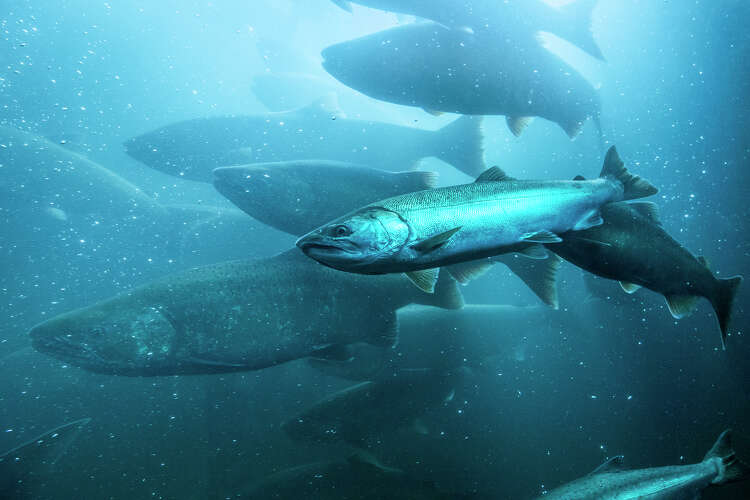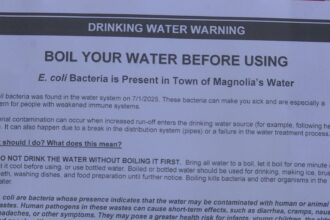Trump Administration Halts Biden-Era Columbia River Fish Restoration Plan
The Donald Trump administration has pulled the federal government out of a Joe Biden-era plan to invest more than $1 billion in restoring endangered Columbia River fish runs.
The original memorandum signed in December 2023 by Biden charged a group of federal agencies, state officials, and several tribal organizations with studying near-term and long-term strategies to improve fish passage and habitat and implement hatchery reforms.
The Contention: Dam Removal
Although not directly stated in Biden’s memorandum, one of the potential outcomes of the study — and the biggest point of contention for the Trump administration — was the removal of four dams along the lower Snake River. A report from the Department of the Interior published last year acknowledged the negative effects federal dam development in the region has had on fish population and local tribes.
Trump’s memorandum reneging the intergovernmental study called the plan “radical environmentalism” and part of a “radical green agenda.”
“The negative impacts from these reckless acts, if completed, would be devastating for the region, and there would be no viable approach to replace the low-cost, baseload energy supplied; the critical shipping channels lost; the vital water supply for local farmers reduced; or the recreational opportunities that would no longer be possible as a result of these acts,” reads the new memorandum.
Part of what the group was studying, according to Nik Blosser, the former executive director of the Columbia River Task Force, was how to replace the power generated by the dams for local communities and manage transportation on the river.
“The Biden administration made it clear that nobody can breach these dams without congressional authorization — an actual act of Congress would be required to do anything,” Blosser told ThePerpetuaPress.com. “All this agreement could do was give us the tools and funding to study the situation, to see if something like dam removal was even achievable.”
Blosser resigned from his position this spring, citing the impacts of the Trump administration’s cuts to the project’s staff and budget, along with high turnover at connected agencies.
Stakeholder Reactions and Impact
He and other former project leaders view the decision to revoke the agreement as another example of the federal government breaking promises to tribal groups over environmental issues.
“We are dismayed that an agreement that was among the best roadmaps charted for helping Columbia Basin salmon — representing years of work by tribes, states, and the federal government — was undone with the stroke of a pen,” Columbia River Inter-Tribal Fish Commission Chair Jeremy Takala said in a statement.
“The Administration’s decision to terminate these commitments echoes the federal government’s historic pattern of broken promises to tribes, and is contrary to President Trump’s stated commitment to domestic energy development,” Yakama Tribal Council Chairman Gerald Lewis added. “This termination will severely disrupt vital fisheries restoration efforts, eliminate certainty for hydro operations, and likely result in increased energy costs and regional instability.”
Trump’s memorandum gave the involved federal agencies a month to identify “any steps that may be taken to rescind or recoup Federal funds obligated to implement the [memorandum]” and report on how they can withdraw from the studies in progress.
The sudden halt to an agreement that was decades in the making has been particularly tough for stakeholders.
“The Resilient Columbia Basin Agreement was the result of years of painstaking work — this was a once-in-a-generation opportunity to modernize infrastructure across the Columbia River Basin, support reliable clean energy, and save imperiled salmon and steelhead runs,” six-term Washington Sen. Patty Murray said in a prepared statement soon after announcement. “The Trump administration’s senseless decision to tear it up is a betrayal of our Tribes and a tremendous setback for the entire Northwest.”
Future Implications
“I think this would have been the largest ecological restoration program in the world,” Blosser said.
On a recent trip to Ireland, Blosser ran into shoreside plaques dedicated to salmon populations in the region that are significantly diminished or no longer there.
“It just reminded me that it’s kind of remarkable that we have these incredible anadromous fish still … and we could have those plaques in 50 years if we don’t do something,” he said. “The problems and challenges here for native fish are not going away. Stopping the studies and burying our heads in the sand is a real shame.”







